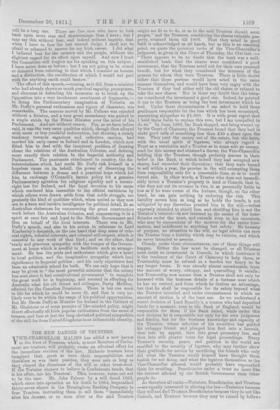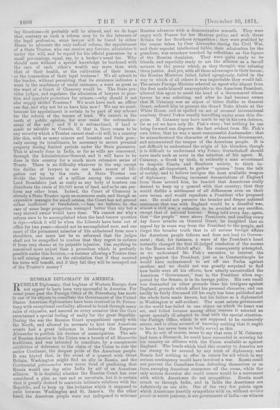THE NEW DANGER OF TRUSTEES.
V ICE-CHANCELLOR MALINS has added a new horror
V to the lives of Trustees, which, as most Members of Parlia- ment are trustees, will probably evoke an effectual effort for the immediate revision of the law. Hitherto trustees have imagined that, great as were their responsibilities and thankless as was their position, they were safe so long as they obeyed the directions of the will or other trust-deed. If the Testator chooses to believe in Confederate bonds, that is his affair, not his Trustees'. This, however, turns out not to be the case. Mr. John Palmer, by a will dated 1862, which came into operation on his death in 1864, bequeathed thirty-seven shares in the Birmingham Banking Company to four Trustees, instructing them to sell them "immediately after his decease, or so soon after as the said Trustees might see fit so to do, or as to the said Trustees should seem proper," and the Trustees, considering the shares valuable pro- perty, retained them till 1866. That they acted in good faith is acknowledged on all hands, but as this is an essential point, we quote the ipsissima verba of the Vice-Chancellor's judgment, as given in the Times of Thursday, the 21st inst.:— "There appears to be no doubt that the bank was a well- established bank, that the shares were considered a good investment, that the Trustees acted not for their own personal benefit, but for what they considered the interests of the persons for whom they were Trustees. There is little doubt either that these persons would have acted in the same manner themselves, and would have been very angry with the Trustees if they had either sold the old shares or refused to take the new shares. Nor is there any doubt that the testa- tor considered the investment a good one, Indeed, he pointed it out to the Trustees as being the best investment which he had. Under these circumstances I am asked to hold these gentlemen responsible for the loss which has been occasioned, amounting altogether to £1,900. It is with great regret that I hold them liable to replace this sum, but I am compelled to do so." In June, 1866, the Bank stopped, and being wound up by the Court of Chancery, the Trustees found that they had to make good calls of something less than £40 a share upon the loss. They paid the money out of the estate, but the heirs, with the usual spirit of legatees, who always regard a Trust as a restriction and a Trustee as in some sort an enemy, sued for this money and obtained a decree, the Vice-Chancellor holding that the Trustees, though perfectly sincere in their belief in the Bank, in which indeed they had accepted new shares, had exceeded their discretion ; that they were bound to sell within a year, the proviso in the will exempting them from responsibility only for a reasonable time, so as to avoid forced sale. In other words, a Trustee who does not immedi- ately invest a Testator's property in land or Consols, that is, who does not cut its revenue in two, is as personally liable to loss as if he were owner of the fortune, though, on the other hand, he can gain nothing by enduring the risk. This liability covers hira as long as he holds the bonds, is not mitigated by any discretion granted him in the will—unless expressly intended to shield him, and shielding him is not the Testator's interest—is not lessened by the assent of the bene- ficiaries under the trust, and extends even to his executors, who may be unconscious of the motives for the entire tran- saction, and indifferent to anything but safety. No honesty of purpose, no attention to the will, no legal advice can save the Trustee from a liability which may be ruinous, and which he never intended to assume.
Clearly, under these circumstances, one of three things will happen. Either the law must be changed, or all Trustees must insist on investment in Consols, in which insistence it is the tendency of the Court of Chancery to help them, or Trusteeship must be refused as a burden too heavy to be any longer borne. It was already almost unendurable, from the amount of worry, obloquy, and quarrelling it entails ; but Trusteeship now means that a Trustee shall not only be harassed with the business details of a fortune over which he has no control, and from which he derives no advantage, but that he shall be responsible for its safety beyond what the Testator intended, and under circumstances in which no amount of caution is of the least use. As we understand a recent decision of Lord Romilly's, a trustee who had deposited funds for a moment, even in the Bank of England, would be responsible for them if the Bank failed, while under this new decision he is responsible not only for his own judgment and fidelity, but for the business knowledge and capacity of the Testator, whose selection of his securities has guided his unhappy friend, and plunged him first into a lawsuit, then into an appeal, then into great pecuniary loss, and then into still greater costs for legal proceedings. Every Trustee's security, peace, and position in the world are sacrified to the security of legatees, who may further show their gratitude for service by sacrificing the friends who only did what the Testator would himself have thought them foolish for not doing, and what the legatees tlaemselves, as the Vice-Chancellor allowed, would probably have reproached them for avoiding. Beneficiaries under a trust no more like the interest allowed by the British Government than other people do. As therefore all ranks—Testators, Beneficiaries, and Trustees —are equally interested in altering the law—Testators because they will not find Trustees, Beneficiaries because they do not like Consols, and Trustees because they may be ruined by follow..
leg directions—it probably will be altered, and we do hope that, contrary as such a reform may be to the interests of the legal profession, some lawyer will be found in either House to advocate the only radical reform, the appointment of a State Trustee, who can receive any fortune, administer it under the will, and be repaid for his official guarantee by a small per-centage, equal, say, to a broker's usual fee. Why should men without a special knowledge be burdened with the care of each other's wealth any more than with that of their health, or the cultivation of their farms, - or the transaction of their legal business ? We all submit to the burden, without perceiving that its existence indicates a want in the machinery of social existence, a want as great as the want of a Court of Chancery would be. The State pro- vides judges, and regulates the admission of lawyers to prac- tice, and appoints protectors for minors,—why should it not also supply skilled Trustees ? We must have such an officer one day, and why not let us have him now ? We say we must, because his appointment is certain to be part of any scheme for the reform of the tenure of land. We cannot, in the teeth of public opinion, for ever resist the enfranchise- ment of the soil ; and if it is enfranchised, if land is made as saleable as Consols, if, that is, there ceases to be any security which a Trustee cannot steal—it will, in a country like this, with so many minors and lunatics and fools gene- rally among its inhabitants, be necessary to secure personal property during limited periods under the State guarantee. This is already done in India, as far as wills are concerned, through the Administrator-General, and it will have to be done in this country for a much more extensive series of Trusts. There is no difficulty whatever in the way, except the dislike of lawyers to see one main source of liti- gation cut up by the roots. A State Trustee can divide the interest of a million among the cousins of Lord Broadshire just as easily as any body of trustees can distribute the rents of 20,000 acres of land, and so ho can per- form any other trust. Indeed, the Court of Chancery is .already a State Trustee upon an enormous scale, and though an expensive manager for small estates, the Court has not proved either inefficient or fraudulent, — has, we believe, in the case of some large properties, managed better than any but a very shrewd owner would have done. We cannot see why a reform sure to be accomplished when the land-tenure question is ripe—which it will be when the Liberals have been out of 'office for two years—should not be accomplished now, and one more of the permanent miseries of life unfastened from men's shoulders, one more law be so reformed that the judges shall not be compelled to confess that they regret to enforce it from very shame at its palpable injustice. Can anything be conceived more unjust than a procedure which is perfectly possible under this decision,—a testator allowing a Trustee time to sell mining shares, on the calculation that if they sucdeed his heirs will benefit, and if they fail they will be recouped out of the Trustee's money ?



































 Previous page
Previous page